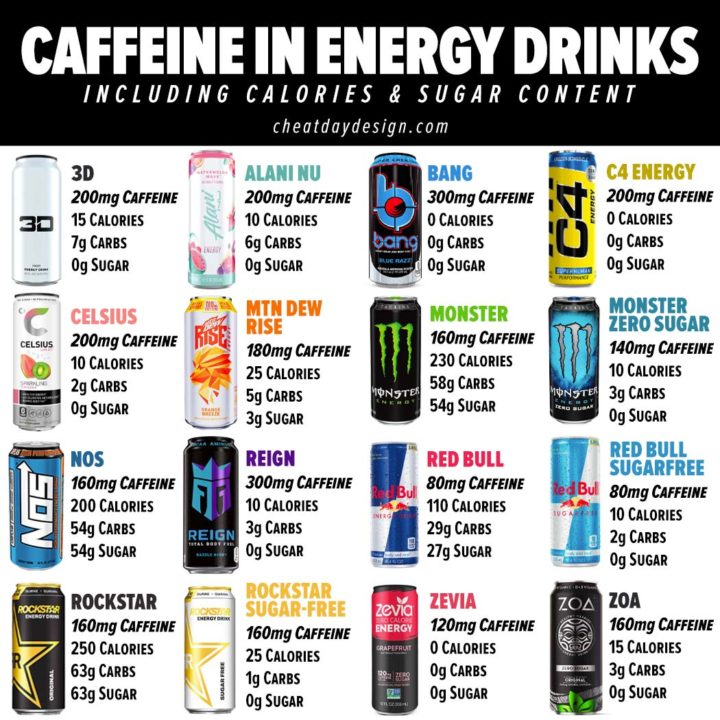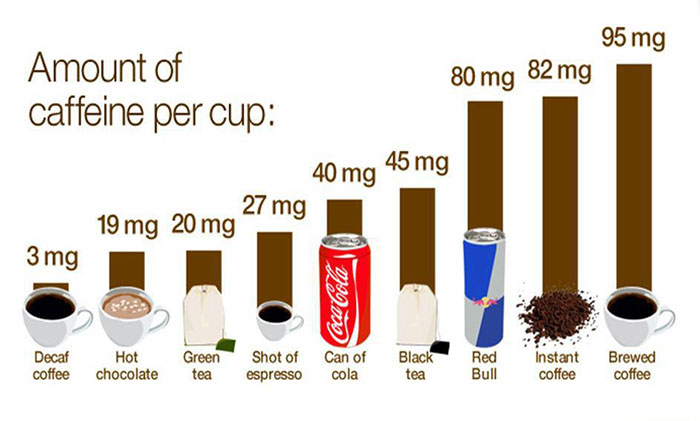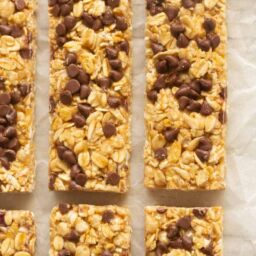Americans drink 3.6 billion ounces of coffee each year. It’s the drink we hate to love. Even though two-thirds of us drink it daily, 32 percent of us still stress about whether it’s really safe.
So the question is, is coffee good or bad for you,, and how much caffeine should you really have a day?
The plus side of coffee
- Daily coffee drinkers have a lower risk of Parkinson’s and Alzheimer’s because caffeine stimulates and protects the brain and central nervous system.
- Coffee drinkers also have a lower risk of diabetes, colon cancer, and gallstones. Now, that may not all be due to caffeine, but coffee does contain compounds and antioxidants that have beneficial effects by themselves or in combination with caffeine. On the other hand, people who drink decaffeinated coffee do have a reduced risk, but decaf only seems to work about half as well as caffeinated coffee.
- Caffeine can help relieve headaches. The popular headache medicine Excedrin contains as much caffeine as a big cup of coffee. Headaches, especially tension-type headaches, are often accompanied by increased blood flow to the brain. This puts pressure on the nerves and causes pain. Caffeine is a vasoconstrictor, meaning that it constricts blood vessels, and this can relieve headache pain. Adding caffeine to a pain reliever like Advil can increase the effectiveness by up to 40%.
- Caffeine enhances athletic performance. Until recently, caffeine was considered a performance-enhancing drug by the International Olympic Committee, and athletes had to keep their caffeine intake low to pass their drug tests. Try drinking a cup of black coffee before your workout and see if you notice an improvement in your performance.
caffeine myths
Many of the negative things you’ve heard about caffeine are actually myths.
Myth #1 – Caffeine consumption is linked to fibrocystic changes, or benign lumps, in the breast. Truth: Trial after the trial has found no connection between caffeine or coffee consumption and breast lumps or fibrocystic breast disease.
Myth #2. Caffeine is dehydrating. Truth: coffee can actually help you meet your fluid needs, according to the Institute of Medicine, and a brand-new American Journal of Clinical Nutrition study strengthens that point. When researchers tested 13 different drinks to determine how hydrating they were, coffee ranked comparably to water. Caffeine is a diuretic, meaning that it makes you pee more. But the fluids in coffee and tea more than replace any fluids that you lose due to the diuretic effect. Not only that, but if you drink coffee regularly, it loses its diuretic effects. Keep in mind that caffeine pills don’t contain any fluids and, therefore, can be dehydrating.
Myth #3. Coffee can cause irregular heartbeat. Truth: although caffeine can temporarily increase your heart rate, it does not cause irregular heartbeat. In fact, coffee consumption is associated with a lower risk of arrhythmias.
Myth #4. Coffee helps you lose weight. Truth: Not exactly. The stimulating effects of caffeine can slightly–, and I mean very slightly–increase your metabolism, but not enough to put you in a big calorie deficit.
Myth #5. Pregnant women shouldn’t drink coffee. Truth: While caffeine does cross the placenta, no concrete studies are saying it’s harmful to the baby. Experts, including the American College of Obstetricians and Gynecologists, agree that 200 mg or less is completely safe. I drank one cup of coffee a day while I was pregnant with both of my kids, but if you’re concerned, talk to your doctor.
Myth #6. Coffee causes cancer. Truth: Studies from the 1970s and 1980s suggested that coffee increased cancer and heart disease risk. These studies failed to separate other unhealthy habits such as physical inactivity and smoking from coffee drinking. Currently, there’s no evidence that coffee causes cancer.
Myth #7. Caffeine stunts your growth. Truth: the belief that coffee stunts your growth is nothing more than an old wives’ tale. It’s unclear how this myth got started, but there’s no scientific evidence supporting it.
The negative side of caffeine
There are some legitimate downsides of caffeine,, but they are relatively minor.
- Some people find that caffeine makes them jittery, anxious and disrupts their sleep. How many cups of coffee you can tolerate or how late in the day you can drink a cup of coffee differs from person to person.
- Caffeine can upset the stomach and make some people nauseous. If you have a sensitive stomach or are especially sensitive to caffeine, choose a more stomach-friendly drink like herbal tea.
- Drinking unfiltered coffee (such as French press or percolated coffee) increases LDL (bad) cholesterol and overall cholesterol and increases the triglycerides in your bloodstream. If you suffer from high cholesterol or have a heart condition, drink filtered coffee.
Amount of caffeine per cup?
Coffee is the primary source of caffeine in the American diet. (Interestingly, it’s also the primary source of antioxidants) But varying amounts of caffeine are also found in tea, soda, energy drinks, chocolate, as well as some over-the-counter pain relievers and dietary supplements.
These infographics show the amount of caffeine in many popular beverages

Final thoughts
Caffeine isn’t as unhealthy as it was once believed. The National health advisory committees in The U.S., Canada, and Europe also agree that 400 mg of caffeine per day is perfectly safe for most healthy people. When enjoying caffeine in moderation, it’s a safe substance with more positive health benefits than negative, so drink on my energy lovers! 🙂





